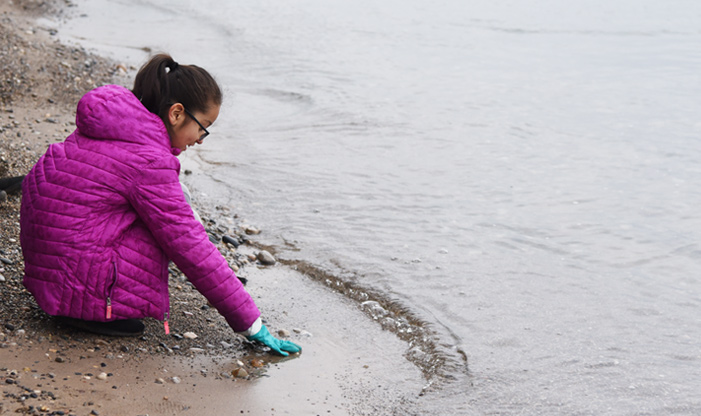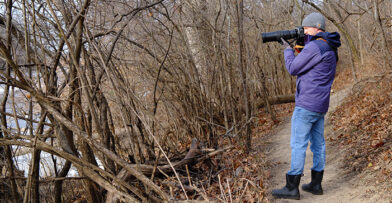Water is such an important part of daily life. People sometimes forget that it’s a precious resource that needs to be both protected and treated intentionally. For middle school students in the Milwaukee area, the River Passport program brings knowledge of water issues and Lake Michigan to light. This is a joint venture between Milwaukee Metropolitan Sewerage District (MMSD) and local nature centers, including Schlitz Audubon.
MMSD funds the Environmental Education Initiative, which strives to teach the importance of water resources in a natural environment. They chose Schlitz Audubon to participate in this project because of our Lake Michigan educational programs and our wide reach within MMSD’s service area. The program includes a component on fresh water at the Center and a tour of Jones’ Island. Together, they provide an engaging day of education about water resources.
Learning about Lake Michigan
Students start in the Center’s classrooms learning about fresh water, highlighting the importance of the Great Lakes. The class explores the scarcity of fresh water using hands-on instruction. They learn that fresh water accounts for only about 2.5 percent of all the water on earth, and that 69.5 percent of that amount is locked up in glaciers. Of the total amount of fresh water in the planet, 20 percent is found in the Great Lakes. We are fortunate to be in such close proximity to such an important resource.
After classroom time, everyone splits up into groups and Center Naturalists lead them down to the lake shore. Measurements are taken with portable chemistry kits, reading the pH, nitrates and nitrites, total dissolved solids, and other aspects of the lake’s composition. Afterwards, the students comb the shoreline gathering washed up trash as part of a clean-up. Throughout the program, they are also given free time to explore and play by the water.
The Lake Up Close
It’s amazing what they find washed up on the shore. Their haul includes plastic bottles, lighters, fragments of cloth, plastic pieces, styrofoam, and more. Center Naturalists say that they can bring classes to this part of the lake any day and find similar amounts of trash. After about one and a half hours, they bring the waste back to the classroom for trash analysis.
Our 60-foot observation tower provides a different vantage point to consider many aspects of the lake. The class talks about the size, cycle, and the composition of Lake Michigan amidst panoramic views from the top of the tower. Back in class, Naturalists bring the effects of plastic pollution to light, including the notion of bioaccumulation and micro plastics. After lunch, the group heads to Jones’ Island for a tour of the facility.
Touring Jones’ Island
The program begins in the classroom with a discussion of the history of Jones’ Island. Tour guides cover the size of the service area and the facility and provide instruction about each step of the water treatment process. Then, they provide the class with hard hats and directions for how to stay safe on the tour. The tour encompasses visiting five areas of the water treatment process, and the Milorganite manufacturing building.
The guides lay out the water’s step-by-step cleaning process, from it arriving at the island to filtering it back into the lake. One step involves the introduction of microscopic organisms and leads to the creation of Milorganite, a natural fertilizer. The class sees each step physically. The treatment areas have a large amount of moving water running through treatment equipment. Each piece of equipment serves a particular function in making the water releasable to the lake. The tour group visits all of these areas and sees how they work up close, including the large building dedicated to making fertilizer. They learn that it takes 24 hours to fully clean the water.
Taken together, the Schlitz Audubon and Jones’ Island field trip provides a comprehensive overview of fresh water as a natural resource. Students learn how fragile water systems are. They see the results of pollution up close and observe how MMSD cleans water and returns it to the natural cycle. Teachers interested in participating in the MMSD River Passport program can contact our registrar at dgulke@schlitzaudubon.org or 414-352-2880 x224.


